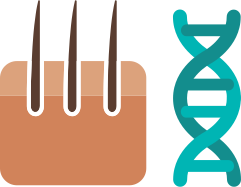How it works
Our hair follicles produce one hair at a time. As hair cells grow from the bottom of the follicle, proteins like keratin help connect and build the cells to form a strand.
The genetic link
23andMe researchers found 17 genetic variants that are associated with back hair. But scientists are still investigating exactly why certain patterns of hair growth occur in some people but not others.

Did you know?
Humans have about 5 million hair follicles, but our body hair is mostly fine, short, and often too tiny to see. Scientists believe our relative hairlessness evolved as our ancient ancestors moved to hotter climates. Less hair made it easier for the human body to stay cool on long, hot days and especially while hunting.
Explore more
What do your genes say about body hair? 23andMe’s Health + Ancestry kit can give you insight into your own backstory. Pick up the kit, spit, and find out whether you’re likely to have back hair based on your genetics. Please note that this report is only available for men.

Health + Ancestry Service
References
23andMe Blog (2018, July 16). “The Complex Genetic Architecture Underlying Human Differences.” Retrieved September 22, 2018, from https://blog.23andme.com/health-traits/the-complex-genetic-architecture-underlying-human-differences/.
Bramble DM et al. (2004). “Endurance running and the evolution of Homo.” Nature. 432(7015):345-52.
Paus R et al. (1999). “The biology of hair follicles.” N Engl J Med. 341(7):491-7.
Qi, J et al. (2014). “An Overview of Alopecias.” Cold Spring Harb Perspect Med. 4(3).
Stenn KS et al. (2001). “Controls of hair follicle cycling.” Physiol Rev. 81(1):449-494.

Leave a Reply